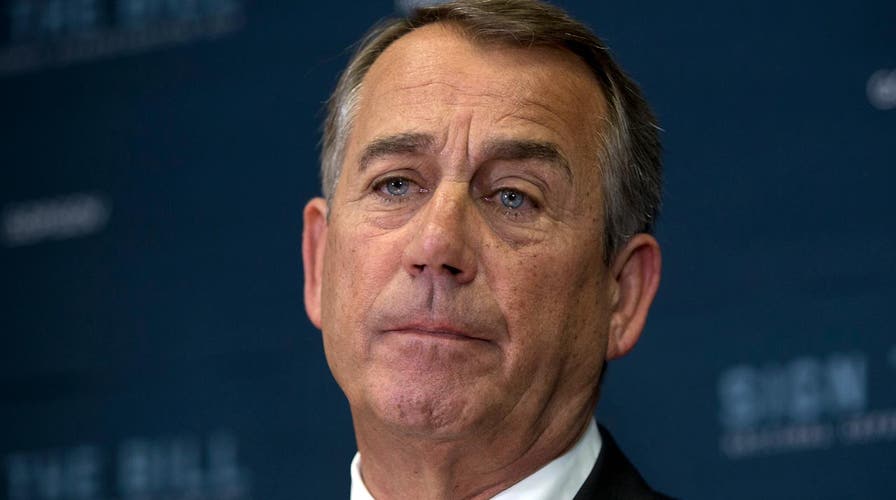Can John Boehner clean the plate for his successor?
Sources claim congressional leaders are closing in on a two year budget package; Mike Emanuel provides insight on 'Special Report'
House Speaker John Boehner is driving to hammer through a newly released two-year budget deal that also raises the debt ceiling before he leaves office, despite conservative opposition that quickly formed after the plan was unveiled.
The retiring House leader acknowledged Tuesday that the behind-closed-doors process that created the plan "stinks," but defended the proposal as a "good deal" all things considered.
"When you look at the alternative, it starts to look a whole lot better," Boehner said.
Boehner appears poised to push the bill through using a controversial approach that has angered conservatives before -- relying on the backing of Democrats, and some Republicans, to pass the measure.
The Ohio Republican said his goal is to "clean out the barn" for the next speaker, likely to be Rep. Paul Ryan, R-Wis., who is seeking the job in votes set for Wednesday and Thursday.
"I've done my best to clean it up," Boehner said.
However, further complicating the deal's future, Sen. Rand Paul, R-Ky., told Fox News Tuesday night that if the plan passes the House, he plans to filibuster it in the Senate.
The pact would fund the government for another two years, ahead of a Dec. 11 deadline to pass a new budget. The legislation also would suspend the current $18.1 trillion debt limit through March 2017. The deadline for doing so is Nov. 3, after which the government might be unable to fund all benefits and agency budgets, and face a potential government default, if the cap is not raised.
But some House conservatives blasted the deal as not going far enough to address excess spending.
Rep. John Fleming, R-La., said he's going to "whip against it."
"Leadership's determination to ram through this legislation days before we reach the debt limit, with zero input from rank and file Members of Congress, demonstrates precisely what is wrong with Washington, D.C.," Rep. Mark Meadows, R-N.C., said.
Other Republicans were resigned to likely passage, as they took their parting shots at Boehner.
"We can't stop it. He's in league with the Democrats," Rep. Thomas Massie, R-Ky., said of Boehner Tuesday morning. "I mean I don't think there's anything you can do at this point."
But Massie also said "it's a long game" and conservatives are winning the war as they have forced Boehner to resign.
The budget vote slated for Wednesday would come on the same day the GOP caucus nominates its candidate, widely expected to be Ryan. The speaker-to-be held off on assessing the deal, saying he had to review it, but he expressed frustration with the rush job.
"I think this process stinks. This is not the way to do the people's business," Ryan told reporters. "Under new management, we're not going to do the people's business this way."
The budget side of the deal is aimed at undoing automatic spending cuts which are a byproduct of a 2011 budget and debt agreement, and the failure of Washington to subsequently tackle the government's fiscal woes. GOP defense hawks are a driving force, intent on reversing the automatic cuts and getting more money for the military. A key priority for Democrats is to boost domestic programs.
The budget portion would increase the current "caps" on total agency spending by $50 billion in 2016 and $30 billion in 2017, offset by savings elsewhere in the budget. And it would permit about $16 billion to be added on top of that in 2016, classified as war funding, with a comparable boost in 2017.
Among the proposed spending cuts in the plan are curbs on Medicare payments for outpatient services provided by hospitals that have taken over doctors' practices, and an extension of a 2 percentage-point cut in Medicare payments to doctors through the end of a 10-year budget. It requires the sale of 58 million barrels of oil from the Strategic Petroleum Reserve, cuts crop insurance payments to insurance providers and requires new auctions of spectrum to communications companies.
It also would clean up expected problems in Social Security and Medicare by fixing a shortfall looming next year in Social Security payments to the disabled, as well as a large increase in Medicare premiums and deductibles for doctors' visits and other outpatient care.
The Associated Press contributed to this report.





